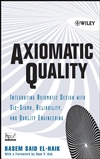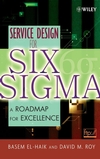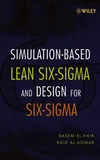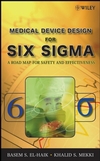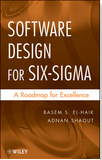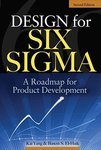

Computer-Aided Robust Design (CARD)
CARD is a process that combines computer experimentation with both probabilistic design and robust design. CARD is a disciplined engineering process that seeks to find the best expression of a system design. "Best" is carefully defined to mean that the design is the lowest-cost solution to the specification, which itself is based on the identified customer needs. In CARD we included design quality as one more dimension of cost. High-quality systems minimize these costs by performing, consistently, at targets specified by the customer.
Different forms of CARD were used in the following books by Dr. El-Haik in the context of Design For Six Sigma (DFSS):
- For Process Design: El-Haik, B. and Alaomar, R.," Simulation-based Lean Six Sigma and Design for Lean Six Sigma", John Wiley & Sons, Inc., forthcoming, July, 2006. ISBN: 0-471-69490-8
- For Product Design: Yang, K. & El-Haik, B., "Design for Six Sigma: A Roadmap for Product Excellence", McGraw Hill, New York, 1st edition 2003, 2nd edition 2008. ISBN: 0071412085.
Computer-Aided Robust Design (CARD) is a DFSS process with SSPI in-house software tool in which parameter design and tolerance design are conducted on a simulation mathematical model instead of physical hardware. In CARD, robustness is the capability of a certain model to perform consistently in the presence of noise. CARD is directly linked to Axiomatic Design & Probabilistic Design Technologies . Transfer functions are derived from computer experimentation. This allows us do either of :
Transfer Function Meta Modeling
Robustness Assessment: to assess the functional requirements in a design matrix in the presence of noise factors. Optimization: To find the nominal settings or tolerance settings such that the functional requirements in a design matrix have minimum variability in the presence of noise.
CARD is used extensively in automotive, medical devices, manufacturing and many other industrial applications. CARD is enabled by simulation and modeling. When a CAE (Computer-Aided Engineering) model is computationally expensive to run or multi response need to be considered (e.g. 2x2 or higher order design matrices), a surrogate model in place of the original CAE will be derived to reduce the number of CAE runs. In CARD, analysis is conducted using a fast-to-compute surrogate model. As a check, the final result of CARD will be confirmed using the original CAE.
CARD helps avoid over/under design by:
- Improving capability of designing for specified customer usage
- Identifying low-cost significant design parameter settings in the design matrix that influence robustness and reliability
- Quantifying contribution of parameters that influence robustness
- Identifying design direction that enables effective search for optimal robust design without trial and error.
- Allowing exploration of the design limits when physical test to failure is too expensive
- Guiding design of more cost effective hardware test with fewer samples
- Shortening RPP time to prevent any robustness issue before hardware is built
- Providing more confidence in getting the first prototype right
- Serving as a faster and cheaper than hardware testing iterations
- Providing the opportunity to perform robust design optimization even before hardware build experimentation is available.
To know more, contact us @: info@sixsigmapi.com or (734) 765-5229.








